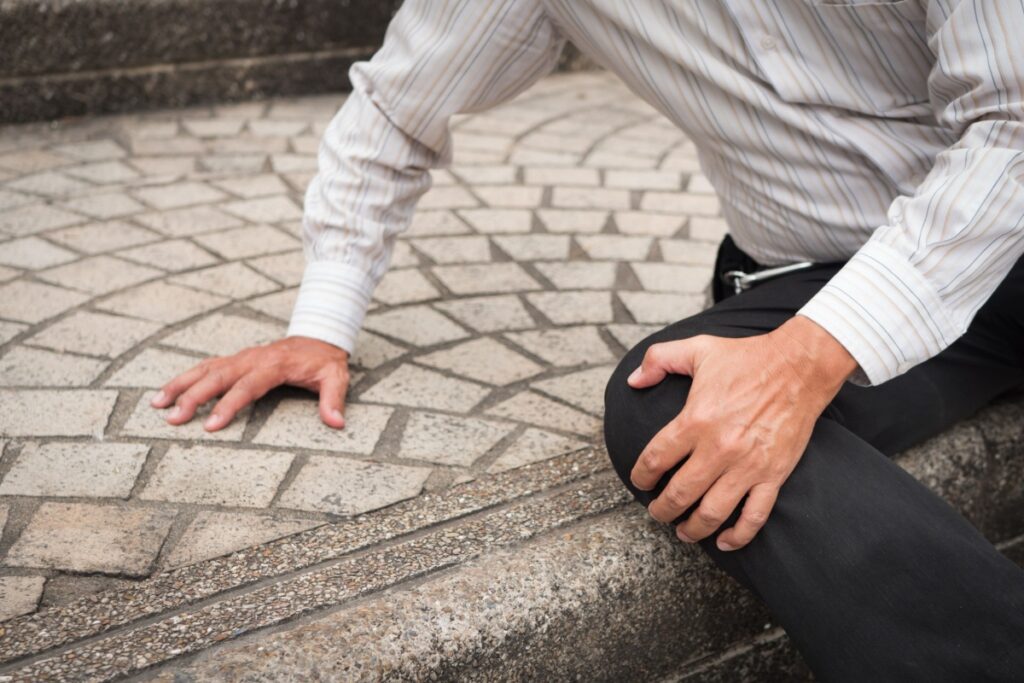Slip and fall accidents in public places, workplaces, and private properties are one of the most common causes of injuries in Australia. You may be entitled to compensation if you’ve experienced a slip and fall injury in New South Wales.
This guide will explain the legal rights of injured individuals, the process of claiming compensation in NSW, and how experienced lawyers can assist such claims.
Understanding Slip and Fall Compensation in NSW
Slip and fall accidents can happen anywhere — shopping centres, restaurants, workplaces, or even on footpaths. These accidents can result in serious injuries ranging from sprains and fractures to more severe traumatic injuries that impact your quality of life and ability to work.
Where this accident occurred will determine the type of compensation an individual may be entitled to. Under NSW law, property owners/occupiers and businesses have a legal duty of care to ensure their premises are reasonably safe for visitors/customers. When they fail to meet this duty and someone is injured as a result, they may be liable for compensation.
If the accident happened in a public location, on the premises of a business, or at another person’s property, an individual may be eligible to pursue a compensation claim through public liability. However, if the accident site is a workplace and the injured person is an employee, then the claim could be made through Workers’ Compensation.
Civil Liability Act 2002 (NSW)
The primary legislation governing slip and fall claims in NSW is the Civil Liability Act 2002 (NSW), which establishes:
- The standard of care expected from property owners and occupiers
- How negligence is determined in personal injury cases
- Limitations on damages that can be awarded
- Defences available to defendants
Under section 5B of this Act, a person is not negligent in failing to take precautions against a risk of harm unless:
- The risk was foreseeable
- The risk was not insignificant
- A reasonable person in the person’s position would have taken precautions
Important Legal Considerations:
Contributory Negligence: Under section 5r of the Civil Liability Act, your compensation may be reduced if you contributed to your injury through your own negligence. For example, if you were distracted by your mobile phone or ignored warning signs.
Obvious Risks: Section 5f of the Civil Liability Act states that a person is not liable for harm suffered from obvious risks of dangerous activities. However, this defence has limitations and doesn’t absolve property owners from their duty to maintain safe premises.
Workers’ Compensation Act 1987 (NSW)
If your slip and fall occurred at work, your claim would be governed by the Workers’ Compensation Act 1987 (NSW) and the Workplace Injury Management and Workers’ Compensation Act 1998 (NSW). In this circumstance, you would need to go through your employer’s insurance for workers’ compensation, and there are different steps to take in making this type of claim.
Competition and Consumer Act 2010 (Cth)
At the federal level, the Australian Consumer Law (Schedule 2 of the Competition and Consumer Act 2010) provides consumer protections that may be relevant in some slip and fall cases, particularly where the injury occurs due to a defective product or service.
GET HELP NOW WITH YOUR PERSONAL INJURY
Get in touch with our Personal Injury Compensation team
Types of Compensation Available for Slip and Fall Injuries
If your slip and fall claim is successful, you may be entitled to compensation for:
- Medical expenses – Past and future costs of treatment, rehabilitation, and care
- Lost income – Wages lost during recovery and potential future earnings if your capacity to work is affected
- Pain and suffering – Compensation for physical pain and psychological impacts
- Domestic assistance – Help with household tasks you can no longer perform
- Out-of-pocket expenses – Travel costs to medical appointments and other related expenses
How to Make a Slip and Fall Claim in NSW
1. Seek Medical Attention
Your health is the priority. Ensure you receive proper medical treatment and that your injuries are officially documented.
2. Report the Incident
Report the accident to the property owner, manager, or relevant authority. Request a copy of any incident report filed.
3. Gather Evidence
Collect evidence supporting your claim, including:
- Photographs of the accident scene and the hazard
- Details of witnesses
- Medical records documenting your injuries
- Proof of expenses and financial losses
4. Seek Legal Advice
Slip and fall claims can be complex, particularly when determining liability and calculating appropriate compensation. An experienced legal firm specialising in personal injury claims can assist you with:
- Assessing the strength of your claim
- Navigating the claims process
- Negotiating with insurers
- Representing you in court if necessary
- Maximise your compensation entitlements
5. Submit a Personal Injury Claim Form
You must lodge a personal injury claim with the responsible party or their insurer for public liability claims.
Key Takeaways
- Property owners & businesses have a legal duty of care to maintain safe premises for visitors and customers.
- Slip and fall compensation claims are governed primarily by the Civil Liability Act 2002 (NSW) for public liability cases or Workers' Compensation Act 1987 for workplace injuries.
- Successful claimants may receive compensation for medical expenses, lost income, pain and suffering, domestic assistance, and out-of-pocket expenses, though compensation may be reduced in cases of contributory negligence.
- Employers have clear obligations for injured workers returning to work, including implementing return-to-work programs, appointing coordinators, providing suitable employment during recovery, and offering retraining opportunities for those unable to resume pre-injury roles.
- Making a successful claim involves seeking immediate medical attention, reporting the incident, gathering evidence, seeking legal advice from personal injury specialists, and submitting the appropriate claim forms to the responsible party or insurer.
Need Help Submitting a Compensation Claim?
Slip hazards can happen at any time, and every case is unique, with outcomes depending on the specific circumstances and evidence available. Seeking professional legal advice early can help ensure you receive fair compensation for your injuries and losses.
Burke Mead Lawyers offers a free consultation to discuss your case – contact our legal experts today.


